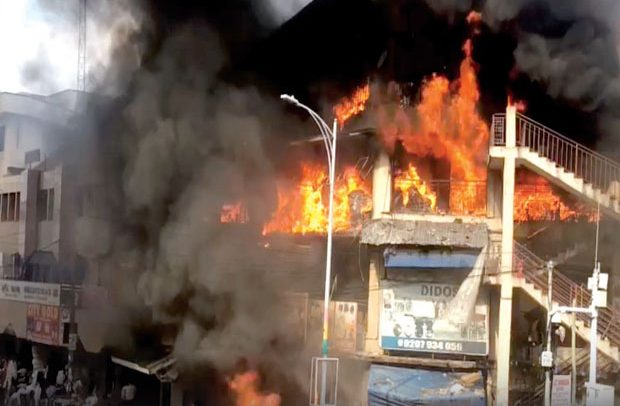The inferno which gutted a four-storey building at Makola last Monday morning and persisted till late afternoon and even the next day brings to the fore a deficiency in our safety discipline.
Our adherence to safety precautionary measures as especially laid-down by fire safety experts leave much to be desired.
We live in a society in which the acquisition of safety certificates from the Ghana National Fire Service (GNFS) to ensure that we adhere to the required standards is done half heartedly. Many acquire the certificates just so they are not penalized for not doing so.
The fear of fire and its consequences is hardly something to be considered because the possibility of this mishap occurring is too distant to cause worry or even apprehension.
The infringement upon safety standards range from using LPG stoves in bedrooms or shops to illegal electrical connections all of which are hardly considered hazardous practices likely to ignite fire.
Existing laws intended to ensure strict adherence to safety measures as they pertain to fire safety exist only in the statutes, hardly enforceable.
A day after the inferno a public announcement was made in the business enclave at Okaishie entreating traders not to put on generators and to avoid cooking in the market enclave.
One of these could have been the source of the fire which turned into an inferno and caused the loss of properties worth millions of cedis.
A couple of days after the fire the memory is still fresh among witnesses and shop owners. This would not last long enough to cause positive attitudinal change towards fire safety because it will soon be forgotten.
There are just a few fire extinguishers in the shops in the business district and of the existing ones only a few are serviceable. Fire safety officers from the GNFS who come to inspect these important gadgets do not receive the necessary cooperation from the shop owners.
Those who do not have fire extinguishers will certainly not be prosecuted for the breach. The fire safety bylaws demand that every shop and even homes have fire extinguishers.
It is only when there is an inferno that people appreciate the importance of fire fighters and their advice about how to prevent fires.
Perhaps now when insurance officials go round canvassing for patronage for their services from shop owners they would be listened to. Some shop owners only think about vehicles when insurance is mentioned. For such persons it is inconceivable to associate insurance with shops and their contents. Now they should start learning about these important services now that they have lost their wares within a few hours.
During the inferno the issue of fire hydrants crops up. Fire tenders have to traverse long distances to fetch water. The impression in the minds of persons with no knowledge of fire fighting as the fire raged was why fire tenders should leave the fire scene to replenish their stock.
Most fire hydrants in Accra have been covered by structures as though these important aspects of urban settlement play no role in our lives.
As far back as our colonial days there were hydrants at vantage locations in Accra. Today these have been covered by storey buildings and nobody cares. Until this is reversed fire tenders will leave fire scenes to stock up their water and return as we saw during the inferno under review.
We are eagerly waiting for the outcome of investigations into the Makola inferno. Like others before it we might not be privy to it, sadly. We think that should not be the case because being told what happened would go a long way to instill safety discipline in us.
Who knows? The inferno could have been started by someone preparing light soup, illegal connection or even a malfunctioning gen set.

